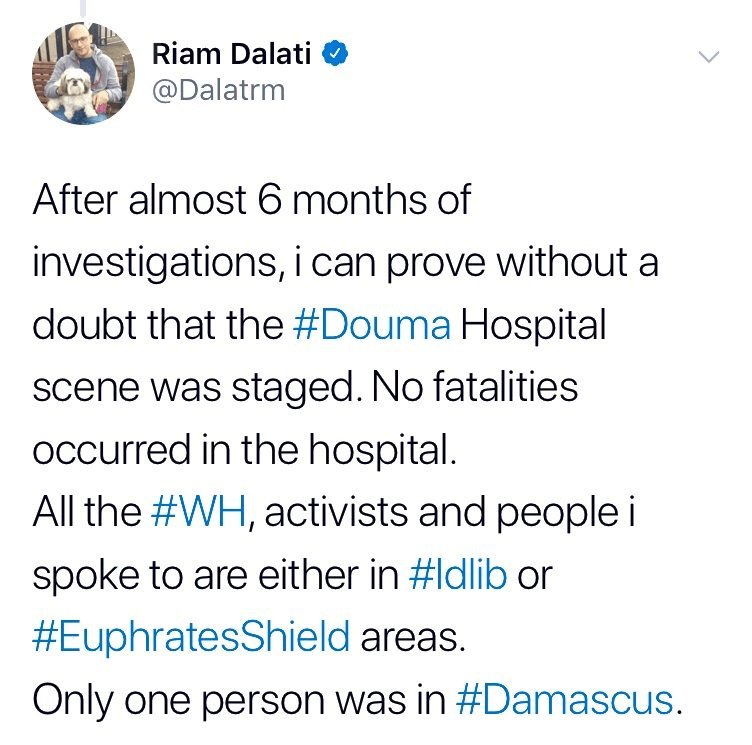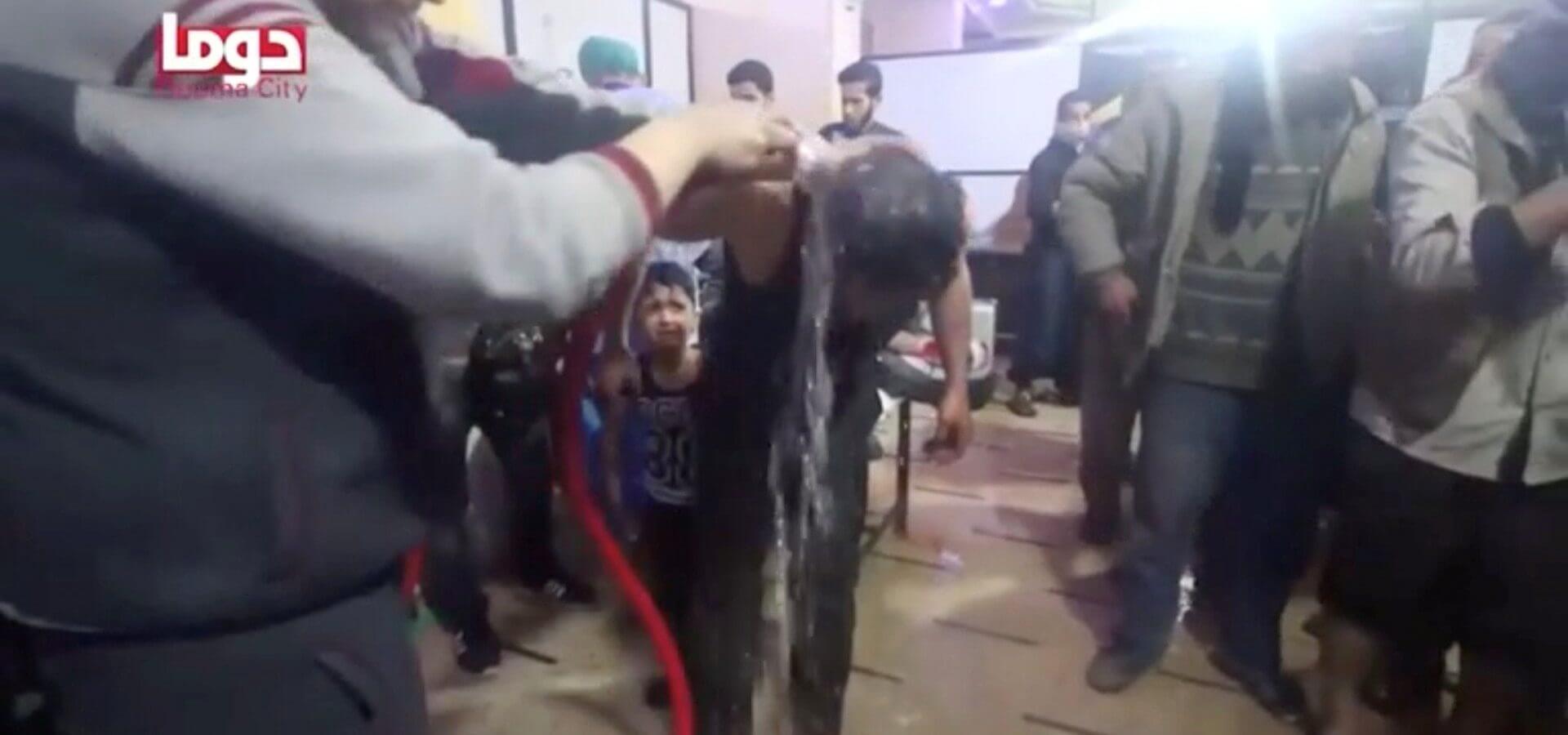Now approaching nearly a year after the April 7, 2018 alleged chemical attack in Douma, Syria — which the White House used as a pretext to bomb Syrian government facilities and bases throughout Damascus — a BBC reporter who investigated the incident on the ground has issued public statements saying the « Assad sarin attack » on Douma was indeed « staged ».
Riam Dalati is a well-known BBC Syria producer who has long reported from the region. He shocked his nearly 20,000 twitter followers on Wednesday, which includes other mainstream journalists from major outlets, by stating that after a « six-month investigation » he has concluded, « I can prove without a doubt that the Douma Hospital scene was staged. »
The « hospital scene » is a reference to part of the horrid footage played over and over again on international networks showing children in a Douma hospital being hosed off and treated by doctors and White Helmets personnel as victims of the alleged chemical attack.
The BBC’s Dalati stated on Wednesday:
After almost 6 months of investigations, I can prove without a doubt that the Douma Hospital scene was staged. No fatalities occurred in the hospital. »
He noted he had interviewed a number of White Helmets and opposition activists while reaching that conclusion.
He continued in a follow-up tweet:
Russia and at least one NATO country knew about what happened in the hospital. Documents were sent. However, no one knew what really happened at the flats apart from activists manipulating the scene there. This is why Russia focused solely on discrediting the hospital scene.
Dalati’s mention of activists at the flats « manipulating the scene there » is a reference to White Helmets and rebel activist produced footage purporting to show the deadly aftermath of a chemical attack inside a second scene — a bombed-out apartment showing dozens of dead bodies.

Tragic and gruesome images of what appeared the « gassed » corpses of young children and women strewn about an apartment building, were recycled endlessly in mainstream media at the time, which the Trump administration referenced in its decision to strike Damascus with some 100 Tomahawk cruise missiles.
Dalati continued:
Truth is James Harkin got the basics right in terms of Douma’s « propaganda » value. The ATTACK DID HAPPEN, Sarin wasn’t used, but we’ll have to wait for OPCW to prove Chlorine or otherwise. However, everything else around the attack was manufactured for maximum effect.
The BBC producer added the following details as part of the thread:
I can tell you that Jaysh al-Islam ruled Douma with an iron fist. They coopted activists, doctors and humanitarians with fear and intimidation. In fact, one of the 3 or 4 people filming the scene was Dr. Abu Bakr Hanan, a « brute and shifty » doctor affiliated with Jaysh Al-Islam. The narrative was that « there weren’t enough drs » but here is one filming and not taking part of the rescue efforts. Will keep the rest for later.
A few hours after making the statements Dalati switched his verified Twitter account to « private », likely after the Russian Embassy in the UK seized upon and began promoting the admission. A number of articles quickly appeared in Russian media as well.
.@BBC’s Syria producer @Dalatrm admits “Assad sarine attack in #Douma was staged”. Remarkable that British MSM chose to ignore it. No breaking news, no articles, nothing. pic.twitter.com/aAo7xq3nPQ
— Russian Embassy, UK (@RussianEmbassy) February 14, 2019
The Russian Foreign Ministry weighed in on Thursday after the BBC producer’s admission, especially since it’s been Moscow’s position the whole time that the events surrounding the Douma attack were staged.
Russia’s TASS news agency cited ministry spokeswoman Maria Zakharova, who slammed the « theater of the absurd » connected to the April 7 events:
The culmination of this theater of absurd may be a statement by a BBC producer who confirmed based on his own research that the footage [in Syria’s Douma] had been staged with direct participation of the White Helmets, » Zakharova said, noting that Russia wants to listen to the company’s position because it actively covered the events from the perspective of supporting the steps of the so-called US-led coalition in Syria.
Russia is now demanding that the BBC produce the results of its investigation for Moscow to review and evaluate.
The BBC’s Dalati made the statements in response to a lengthy investigative report by James Harkin writing for The Intercept. Harkin had examined the scenes and physical environs of the alleged Douma attack and interviewed eyewitnesses on site. His report paints a complex picture of propaganda and deeply compromised rebel sources such as Saudi-backed Jaish al Islam, which had control of Douma amidst a Syrian government onslaught to retake the town.
The « hospital scene » footage, now called « staged » by a BBC producer, circulated widely among media outlets at the time:
Harkin made mention of plausible early reports that the Douma victims had actually died of asphyxiation while hiding in an enclosed space or bunker due to repeated waves of conventional ordinance fired by the Syrian Army:
When it came to Douma, the Russians weren’t the only ones who were skeptical, at least initially, that chemical weapons had been used. The Syrian Observatory for Human Rights, a U.K.-based outfit that leans toward the opposition but whose reporting network inside the country is usually seen as most authoritative by the international media, noted the day after the attack that people had died in Douma through suffocation, but couldn’t say whether chemical weapons had been used.
The Intercept report also highlighted the fact that the Organization for the Prohibition of Chemical Weapons investigation flatly contradicted Washington’s claims that sarin had been used. Instead, « samples collected at both locations turned up ‘various chlorinated organic chemicals’ along with ‘the residues of explosive’ — not quite the same thing as saying that chlorine had been used as a chemical weapon… » according to the report.
Harkin further underscored that the OPCW’s on-site findings came as « something of a surprise » to analysts who had long parroted the early US and mainstream media claims of a confirmed chemical attack:
At least some of that caution appears to have been warranted. Three months after the attack, the OPCW released its interim report into what happened in Douma. The report found no evidence of organophosphorus nerve agents like sarin either at the site or in samples from the casualties — something of a surprise, because the suspected use of sarin had been one of the justifications for American airstrikes back in April, and alleged Syrian chemical weapons facilities their primary target. But the investigators did find something else.
Interestingly, the BBC’s Dalati had actually first hinted he knew that elements surrounding the Douma attack had been staged a mere days after the incident.
In a now deleted April 11, 2018 tweet, he stated:
Sick and tired of activists and rebels using corpses of dead children to stage emotive scenes for Western consumption. Then they wonder why some serious journos are questioning part of the narrative. »
Thus far mainstream networks have not picked up on this latest bombshell admission from the BBC producer, but it will be interesting to see if there’s any formal response from the BBC based on the Russian foreign ministry’s request.
Top Photo | The aftermath of an alleged chemical attack in Douma, Syria, April, 7, 2018. Photo | Screenshot from White Helmets video
Source | ZeroHedge


